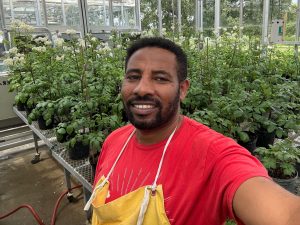Gashaw Alemu
Position title: PhD Student - Plant Pathology
Email: galemu@wisc.edu
Address:
MS - Biotechnology, Addis Ababa University, Ethiopia
BS - Horticulture, Jimma University, Ethiopia

It is an honor to work on potato, one of the world’s most important food crops. I’m originally from Ethiopia. After graduating, I served for over 10 years as a researcher at the Amhara Agricultural Research Institute, where I was responsible for designing and conducting both lab and field-based potato research. In fall 2023, I joined the Department of Plant Pathology as a graduate research assistant. I am co-advised by Professor Amanda Gevens and Emeritus Professor Caitilyn Allen. My Ph.D. research focuses on developing and advancing methods for effective management of potato diseases.
Because potatoes are propagated clonally, they are prone to tuber-transmitted diseases that inflict major yield losses. My research project centered on two key potato pathosystems: silver scurf and bacterial wilt. Silver scurf, caused by the fungal pathogen Helminthosporium solani, is a growing concern for potato growers in Wisconsin and beyond, affecting tuber quality, marketability, and storability. Diploid potatoes offer a rapid and powerful approach to resistance breeding. In close collaboration with Dr Jeff Endelman’s potato breeding and genetics program, we have developed a breeding experiment to screen diploid potato germplasm for resistance to silver scurf. Until we have resistant potato varieties, fungicide will be an essential component of silver scurf disease management. However, fungicides put selective pressure on pathogens, leading to the emergence of chemical-resistant strains. Previous Ph.D. students in Gevens’ lab have collected H. solani strains from Wisconsin. Building on this work, I will use genetic and molecular tools to identify the mutant fungal gene(s) responsible for fungicide resistance. Bacterial wilt, caused by Ralstonia solanacearum, is one of the world’s most destructive potato diseases. In the Allen lab, I investigated how different Ralstonia strains colonize potato tubers and optimized a rapid field detection method to ensure the production of clean seed tubers. We also showed that the potato cv. Granola has useful tolerance to bacterial wilt. Overall, my Ph.D. work aims to increase the sustainability and profitability of the potato industry through advanced disease management.